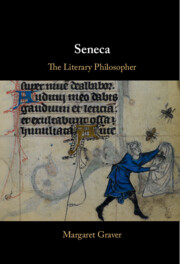Book contents
- Seneca
- Seneca
- Copyright page
- Contents
- Figures
- Preface
- Texts, Translations, and Abbreviations
- Introduction
- Part I Recreating the Stoic Past
- Part II Rival Traditions in Philosophy
- Chapter 4 Seneca and Epicurus
- Chapter 5 Refuting the Peripatetics
- Part III Models of Emotional Experience
- Part IV The Self within the Text
- Bibliography
- Passages Treated
- Index
Chapter 4 - Seneca and Epicurus
from Part II - Rival Traditions in Philosophy
Published online by Cambridge University Press: 23 March 2023
- Seneca
- Seneca
- Copyright page
- Contents
- Figures
- Preface
- Texts, Translations, and Abbreviations
- Introduction
- Part I Recreating the Stoic Past
- Part II Rival Traditions in Philosophy
- Chapter 4 Seneca and Epicurus
- Chapter 5 Refuting the Peripatetics
- Part III Models of Emotional Experience
- Part IV The Self within the Text
- Bibliography
- Passages Treated
- Index
Summary
Chapter 4 is an in-depth study of Seneca’s handling of Epicurean material throughout his philosophical writings. It is primarily because of his interest in Epicurus that Seneca in the past was sometimes labeled an “eclectic” philosopher. In reality, he is implacably hostile to the philosophical doctrines of Epicureanism, from atomism and the idleness of the gods to the pleasure principle and the utilitarian basis of friendship and justice. In the Letters on Ethics, however, he signals receptivity to some of Epicurus’s therapeutic strategies, where he finds them psychologically plausible. These strategies include the use of maxims in teaching and certain arguments against the fear of death and of bodily pain. Seneca is able to adapt these to his own purposes without sacrificing his own Stoic principles.
Keywords
- Type
- Chapter
- Information
- SenecaThe Literary Philosopher, pp. 87 - 108Publisher: Cambridge University PressPrint publication year: 2023

